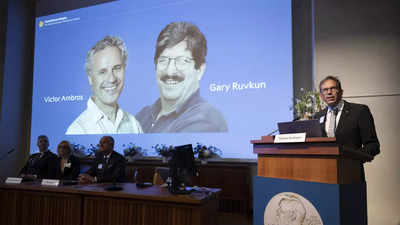
Victor Ambros, along with Gary Ruvkun, has been awarded the 2024 Nobel Prize in Physiology or Medicine for their groundbreaking discovery of microRNA and its role in post-transcriptional gene regulation. This discovery has revolutionised our understanding of gene activity, shedding light on how cells selectively activate certain genes while silencing others, a critical process for the proper development and function of organisms.
MicroRNAs are small RNA molecules that play a crucial role in this gene regulation process.Ambros and Ruvkun’s research revealed how these tiny molecules help control gene expression, ensuring that the right instructions are activated in each cell type. The discovery has had far-reaching implications in fields ranging from developmental biology to medical research, particularly in understanding diseases like cancer, diabetes, and autoimmune disorders.
The Nobel Prize Committee honoured their research for unveiling a new layer of gene regulation. Prior to their work, gene regulation was primarily understood at the transcriptional level, where DNA is transcribed into RNA. Ambros and Ruvkun showed that gene expression can also be regulated after transcription, through microRNAs, which can prevent specific messenger RNA molecules from being translated into proteins. This discovery opened a new dimension in molecular biology and has become fundamental to modern genetics.
Who is Victor Ambros?
Victor R. Ambros, born in 1953 in Hanover, New Hampshire, is an American developmental biologist known for his pioneering work in RNA biology. He is currently a professor at the University of Massachusetts Medical School in Worcester, Massachusetts, where he continues his research on microRNAs and gene regulation.
Ambros’ journey into scientific prominence began during his graduate studies at the Massachusetts Institute of Technology (MIT). He completed both his undergraduate degree and PhD at MIT, under the supervision of Nobel laureate David Baltimore. His postdoctoral work with H. Robert Horvitz, another Nobel Prize winner, laid the groundwork for his later discoveries in developmental timing.
In the early 1990s, Ambros and his research team made a breakthrough by discovering the first microRNA, produced by the lin-4 gene in the model organism Caenorhabditis elegans. This discovery marked a turning point in understanding how small RNA molecules regulate gene expression. His work showed that microRNAs are not just passive byproducts of RNA processing but active regulators of gene function.
Past six years of Nobel Prize winners in Physiology or Medicine:
Ambros’ Scientific Contributions
Over the past three decades, Ambros’ research has significantly advanced the field of molecular biology. His discovery of microRNA revealed a previously unknown mechanism by which cells regulate the timing and pattern of gene expression. Today, microRNAs are known to play key roles in many biological processes, including development, cell differentiation, and disease progression.
Ambros’ contributions to science extend beyond this discovery. His research has also helped clarify the molecular mechanisms underlying developmental timing, particularly in how genes are turned on and off during different stages of growth and development. This has had important implications for understanding not only basic biology but also medical conditions where gene regulation is disrupted.
Now widely recognized for his innovative work, Ambros continues to shape the future of genetics and developmental biology. His research has laid the foundation for further studies on gene regulation and has opened new avenues for developing treatments for diseases linked to microRNA dysfunction.

